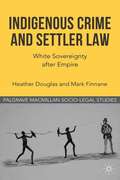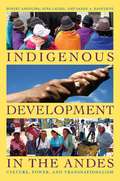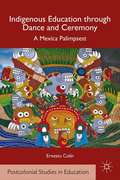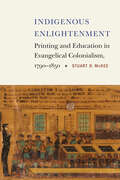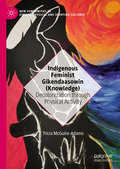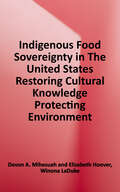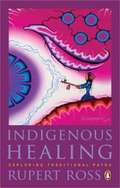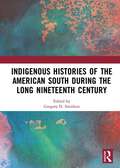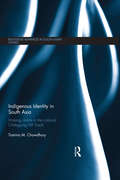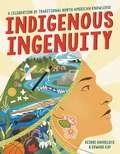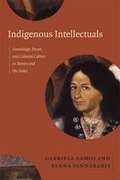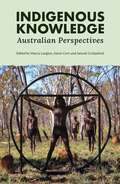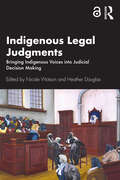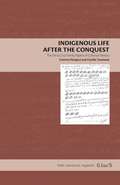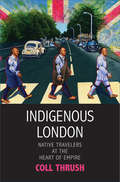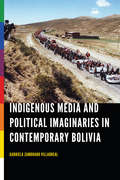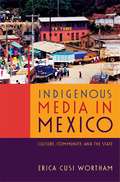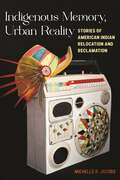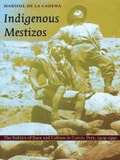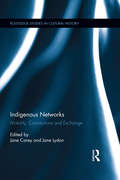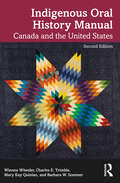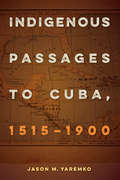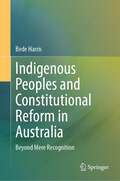- Table View
- List View
Indigenous Crime and Settler Law: White Sovereignty after Empire (Palgrave Socio-Legal Studies)
by Heather Douglas Mark FinnaneIn a break from the contemporary focus on the law's response to inter-racial crime, the authors examine the law's approach to the victimization of one Indigenous person by another. Drawing on a wealth of archival material relating to homicides in Australia, they conclude that settlers and Indigenous peoples still live in the shadow of empire.
Indigenous Development in the Andes: Culture, Power, and Transnationalism
by Robert Andolina Nina Laurie Sarah A. RadcliffeAs indigenous peoples in Latin America have achieved greater prominence and power, international agencies have attempted to incorporate the agendas of indigenous movements into development policymaking and project implementation. Transnational networks and policies centered on ethnically aware development paradigms have emerged with the goal of supporting indigenous cultures while enabling indigenous peoples to access the ostensible benefits of economic globalization and institutionalized participation. Focused on Bolivia and Ecuador, Indigenous Development in the Andes is a nuanced examination of the complexities involved in designing and executing "culturally appropriate" development agendas. Robert Andolina, Nina Laurie, and Sarah A. Radcliffe illuminate a web of relations among indigenous villagers, social movement leaders, government officials, NGO workers, and staff of multilateral agencies such as the World Bank. The authors argue that this reconfiguration of development policy and practice permits Ecuadorian and Bolivian indigenous groups to renegotiate their relationship to development as subjects who contribute and participate. Yet it also recasts indigenous peoples and their cultures as objects of intervention and largely fails to address fundamental concerns of indigenous movements, including racism, national inequalities, and international dependencies. Andean indigenous peoples are less marginalized, but they face ongoing dilemmas of identity and agency as their fields of action cross national boundaries and overlap with powerful institutions. Focusing on the encounters of indigenous peoples with international development as they negotiate issues related to land, water, professionalization, and gender, Indigenous Development in the Andes offers a comprehensive analysis of the diverse consequences of neoliberal development, and it underscores crucial questions about globalization, governance, cultural identity, and social movements.
Indigenous Education through Dance and Ceremony: A Mexica Palimpsest (Postcolonial Studies in Education )
by Ernesto Tlahuitollini" ColínIn the first book on Aztec dance in the United States, Ernesto Colín combines cultural anthropology, educational theory, and postcolonial theory to create an innovative, interdisciplinary, long-term ethnography of an Aztec dance circle and makes a case for the use of the metaphor of palimpsest as an ethnographic research tool.
Indigenous Enlightenment: Printing and Education in Evangelical Colonialism, 1790–1850
by Stuart McKeeIn Indigenous Enlightenment Stuart D. McKee examines the methodologies, tools, and processes that British and American educators developed to inculcate Indigenous cultures of reading. Protestant expatriates who opened schools within British and U.S. colonial territories between 1790 and 1850 shared the conviction that a beneficent government should promote the enlightenment of its colonial subjects. It was the aim of evangelical enlightenment to improve Indigenous peoples&’ welfare through the processes of Christianization and civilization and to transform accepting individuals into virtuous citizens of the settler-colonial community. Many educators quickly discovered that their teaching efforts languished without the means to publish books in the Indigenous languages of their subject populations. While they could publish primers in English by shipping manuscripts to printers in London or Boston, books for Indigenous readers gained greater accuracy and influence when they stationed a printer within the colony. With a global perspective traversing Western colonial territories in the U.S.-Mexico borderlands, the South Pacific, Madagascar, India, and China, Indigenous Enlightenment illuminates the challenges that British and American educators faced while trying to coerce Indigenous children and adults to learn to read. Indigenous laborers commonly supported the tasks of editing, printing, and dissemination and, in fact, dominated the workforce at most colonial presses from the time printing began. Yet even in places where schools and presses were in synchronous operation, missionaries found that Indigenous peoples had their own intellectual systems, and most did not learn best with Western methods.
Indigenous Feminist Gikendaasowin: Decolonization through Physical Activity (New Femininities in Digital, Physical and Sporting Cultures)
by Tricia McGuire-AdamsThis book presents knowledge from Indigenous women who enact decolonization and wellbeing through physical activity. In sport, physical activity, and health disciplines, there is a significant need for Indigenous women’s theoretical and methodological perspectives. While much research is published from a Western perspective on Indigenous peoples’ health, sport, and physical activity, less is known from Indigenous feminist and community perspectives. The chapters therefore inform the broader sociology of sport and Indigenous feminist fields on Indigenous cultural perspectives of physical activity.
Indigenous Food Sovereignty in the United States: Restoring Cultural Knowledge, Protecting Environments, and Regaining Health (New Directions In Native American Studies Ser.)
by Devon A. Mihesuah Elizabeth Hoover"All those interested in Indigenous food systems, sovereignty issues, or environment, and their path toward recovery should read this powerful book." -Kathie L. Beebe, American Indian Quarterly Centuries of colonization and other factors have disrupted indigenous communities' ability to control their own food systems. This volume explores the meaning and importance of food sovereignty for Native peoples in the United States, and asks whether and how it might be achieved and sustained. Unprecedented in its focus and scope, this collection addresses nearly every aspect of indigenous food sovereignty, from revitalizing ancestral gardens and traditional ways of hunting, gathering, and seed saving to the difficult realities of racism, treaty abrogation, tribal sociopolitical factionalism, and the entrenched beliefs that processed foods are superior to traditional tribal fare. The contributors include scholar-activists in the fields of ethnobotany, history, anthropology, nutrition, insect ecology, biology, marine environmentalism, and federal Indian law, as well as indigenous seed savers and keepers, cooks, farmers, spear fishers, and community activists. After identifying the challenges involved in revitalizing and maintaining traditional food systems, these writers offer advice and encouragement to those concerned about tribal health, environmental destruction, loss of species habitat, and governmental food control.
Indigenous Healing: Exploring Traditional Paths
by Rupert RossImagine a world in which people see themselves as embedded in the natural order, with ethical responsibilities not only toward each other, but also toward rocks, trees, water and all nature. Imagine seeing yourself not as a master of Creation, but as the most humble, dependent and vulnerable part. Rupert Ross explores this indigenous world view and the determination of indigenous thinkers to restore it to full prominence today. He comes to understand that an appreciation of this perspective is vital to understanding the destructive forces of colonization. As a former Crown Attorney in northern Ontario, Ross witnessed many of these forces. He examines them here with a special focus on residential schools and their power to destabilize entire communities long after the last school has closed. With help from many indigenous authors, he explores their emerging conviction that healing is now better described as "decolonization therapy." And the key to healing, they assert, is a return to the traditional indigenous world view. The author of two previous bestsellers on indigenous themes, Dancing with a Ghost and Returning to the Teachings, Ross shares his continuing personal journey into traditional understanding with all of the confusion, delight and exhilaration of learning to see the world in a different way. Ross sees the beginning of a vibrant future for indigenous people across Canada as they begin to restore their own definition of a "healthy person" and bring that indigenous wellness into being once again. Indigenous Healing is a hopeful book, not only for indigenous people, but for all others open to accepting some of their ancient lessons about who we might choose to be.
Indigenous Histories of the American South during the Long Nineteenth Century
by Gregory D. SmithersNative Southerners lived in vibrant societies, rich in tradition and cultural sophistication, for thousands of years before the arrival of European colonization in the sixteenth and seventeenth centuries. Over the ensuing centuries, Native Southerners adapted to the presence of Europeans, endeavouring to incorporate them into their social, cultural, and economic structures. However, by the end of the American Revolutionary War, Indigenous communities in the American South found themselves fighting for their survival. This collection chronicles those fights, revealing how Native Southerners grappled with colonial legal and political pressure; discussing how Indigenous leaders navigated the politics of forced removal; and showing the enduring strength of Native Americans who evaded removal and remained in the South to rebuild communities during the latter half of the nineteenth century. This book was originally published as a special issue of American Nineteenth Century History.
Indigenous Identity in South Asia: Making Claims in the Colonial Chittagong Hill Tracts (Routledge Advances in South Asian Studies)
by Tamina M. ChowdhuryIn the immediate aftermath of the creation of Bangladesh in 1971, an armed struggle ensued in its remote south-eastern corner. The hill people in the Chittagong Hill Tracts, more commonly referred to as paharis, demanded official recognition, and autonomy, as the indigenous people of the Tracts. This demand for autonomy was primarily based on the claim that they were ethnically distinct from the majority ‘Bengali’ population of Bangladesh, and thereby needed to protect their unique identity. This book challenges the general perception within existing scholarship that indigenous claims coming from the Tracts are a recent and contemporary phenomenon, which emerged with the founding of the Bangladesh state. By analysing the processes of colonisation in the Chittagong Hill Tracts, the author argues that identities of distinct ethnicity and tradition predate the creation of Bangladesh, and first began to evolve under British patronage. It is asserted that claims to indigeneity must be understood as an outcome of prolonged and complex processes of interaction between hill peoples – largely the Hill Tracts elites – and the Raj. Using hitherto unexplored archival sources, Indigenous Identity in South Asia sheds new light on how the concepts of ‘territory’, and of a ‘people indigenous to it’ came to be forged and politicised. By showing a far deeper historical lineage of claims making in the Tracts, it adds a new dimension to existing studies on Bangladesh’s borders and its history. The book will also be a key resource for scholars of South Asian history and politics, colonial history and those studying indigenous identity.
Indigenous Ingenuity: A Celebration of Traditional North American Knowledge
by Edward Kay Deidre HavrelockCelebrate Indigenous thinkers and inventions with this beautifully designed, award-winning interactive nonfiction book—perfect for fans of Braiding Sweetgrass. <P><P>Corn. Chocolate. Fishing hooks. Boats that float. Insulated double-walled construction. Recorded history and folklore. Life-saving disinfectant. Forest fire management. Our lives would be unrecognizable without these, and countless other, scientific discoveries and technological inventions from Indigenous North Americans. Spanning topics from transportation to civil engineering, hunting technologies, astronomy, brain surgery, architecture, and agriculture, Indigenous Ingenuity is a wide-ranging STEM offering that answers the call for Indigenous nonfiction by reappropriating hidden history. <P><P>The book includes fun, simple activities and experiments that kids can do to better understand and enjoy the principles used by Indigenous inventors. Readers of all ages are invited to celebrate traditional North American Indigenous innovation, and to embrace the mindset of reciprocity, environmental responsibility, and the interconnectedness of all life.
Indigenous Intellectuals: Knowledge, Power, and Colonial Culture in Mexico and the Andes
by Yanna Yannakakis Gabriela RamosVia military conquest, Catholic evangelization, and intercultural engagement and struggle, a vast array of knowledge circulated through the Spanish viceroyalties in Mexico and the Andes. This collection highlights the critical role that indigenous intellectuals played in this cultural ferment. Scholars of history, anthropology, literature, and art history reveal new facets of the colonial experience by emphasizing the wide range of indigenous individuals who used knowledge to subvert, undermine, critique, and sometimes enhance colonial power. Seeking to understand the political, social, and cultural impact of indigenous intellectuals, the contributors examine both ideological and practical forms of knowledge. Their understanding of "intellectual" encompasses the creators of written texts and visual representations, functionaries and bureaucrats who interacted with colonial agents and institutions, and organic intellectuals.Contributors. Elizabeth Hill Boone, Kathryn Burns, John Charles, Alan Durston, María Elena Martínez, Tristan Platt, Gabriela Ramos, Susan Schroeder, John F. Schwaller, Camilla Townsend, Eleanor Wake, Yanna Yannakakis
Indigenous Knowledge: Australian Perspectives
by Marcia Langton Aaron Corn Samuel CurkpatrickHow are we to live well with others? How can we sustain abundant environments and nourishing cultures? How might connections to place and generations past strengthen our cultural, political and economic futures? Indigenous knowledge traditions have been fundamental to human life in Australia for countless generations. They carry understandings of ancestral histories, and exemplify beneficial behaviours for living well on country, managing environmental resources and maintaining social cohesion. Australia has developed collaborative approaches to Indigenous Knowledge research that are unique in the global context. These approaches centre the wisdom of Indigenous knowledge-holders across interdisciplinary fields of enquiry as diverse as medicine, health and wellbeing, social and economic development, environmental management, agriculture and horticulture, history, law and the creative arts. Indigenous Knowledge: Australian Perspectives reveals how Indigenous ways of being and knowing are intricately tied to place, expressed through beauty, and resound with wisdom. It argues that the world's contemporary challenges can be addressed, and socio-environmental diversity sustained, through conversations with both our ancestral pasts and the ancestral futures that we leave behind.
Indigenous Legal Judgments: Bringing Indigenous Voices into Judicial Decision Making
by Nicole Watson and Heather DouglasThis book is a collection of key legal decisions affecting Indigenous Australians, which have been re-imagined so as to be inclusive of Indigenous people’s stories, historical experience, perspectives and worldviews. In this groundbreaking work, Indigenous and non-Indigenous scholars have collaborated to rewrite 16 key decisions. Spanning from 1889 to 2017, the judgments reflect the trajectory of Indigenous people’s engagements with Australian law. The collection includes decisions that laid the foundation for the wrongful application of terra nullius and the long disavowal of native title. Contributors have also challenged narrow judicial interpretations of native title, which have denied recognition to Indigenous people who suffered the prolonged impacts of dispossession. Exciting new voices have reclaimed Australian law to deliver justice to the Stolen Generations and to families who have experienced institutional and police racism. Contributors have shown how judicial officers can use their power to challenge systemic racism and tell the stories of Indigenous people who have been dehumanised by the criminal justice system. The new judgments are characterised by intersectional perspectives which draw on postcolonial, critical race and whiteness theories. Several scholars have chosen to operate within the parameters of legal doctrine. Some have imagined new truth-telling forums, highlighting the strength and creative resistance of Indigenous people to oppression and exclusion. Others have rejected the possibility that the legal system, which has been integral to settler-colonialism, can ever deliver meaningful justice to Indigenous people.
Indigenous Legal Judgments: Bringing Indigenous Voices into Judicial Decision Making
by Nicole Watson and Heather DouglasThis book is a collection of key legal decisions affecting Indigenous Australians, which have been re-imagined so as to be inclusive of Indigenous people’s stories, historical experience, perspectives and worldviews.In this groundbreaking work, Indigenous and non-Indigenous scholars have collaborated to rewrite 16 key decisions. Spanning from 1889 to 2017, the judgments reflect the trajectory of Indigenous people’s engagements with Australian law. The collection includes decisions that laid the foundation for the wrongful application of terra nullius and the long disavowal of native title. Contributors have also challenged narrow judicial interpretations of native title, which have denied recognition to Indigenous people who suffered the prolonged impacts of dispossession. Exciting new voices have reclaimed Australian law to deliver justice to the Stolen Generations and to families who have experienced institutional and police racism. Contributors have shown how judicial officers can use their power to challenge systemic racism and tell the stories of Indigenous people who have been dehumanised by the criminal justice system.The new judgments are characterised by intersectional perspectives which draw on postcolonial, critical race and whiteness theories. Several scholars have chosen to operate within the parameters of legal doctrine. Some have imagined new truth-telling forums, highlighting the strength and creative resistance of Indigenous people to oppression and exclusion. Others have rejected the possibility that the legal system, which has been integral to settler-colonialism, can ever deliver meaningful justice to Indigenous people.The Open Access version of this book, available at http://www.taylorfrancis.com, has been made available under a Creative Commons Attribution-Non Commercial-No Derivatives (CC-BY-NC-ND) 4.0 license.
Indigenous Life After the Conquest: The De la Cruz Family Papers of Colonial Mexico (Latin American Originals #16)
by Camilla Townsend Caterina PizzigoniThis book presents a unique set of written records belonging to the De la Cruz family, caciques of Tepemaxalco in the Toluca Valley. Composed in Nahuatl and Spanish and available here both in the original languages and in English translation, this collection of documents opens a window onto the life of a family from colonial Mexico’s indigenous elite and sheds light on the broader indigenous world within the Spanish colonial system.The main text is a record created in 1647 by long-serving governor don Pedro de la Cruz and continued by his heirs through the nineteenth century, along with two wills and several other notable documents. These sources document a community history, illuminating broader issues centering on politics, religion, and economics as well as providing unusual insight into the concerns and values of indigenous leaders. These texts detail the projects financed by the De la Cruz family, how they talked about them, and which belongings they deemed important enough to pass along after their death. Designed for classroom use, this clear and concise primary source includes a wealth of details about indigenous everyday life and preserves and makes accessible a rich and precious heritage. The engaging introduction highlights issues of class relations and the public and performative character of Nahua Christianity. The authors provide the necessary tools to help students understand the colonial context in which these documents were produced.
Indigenous Life After the Conquest: The De la Cruz Family Papers of Colonial Mexico (Latin American Originals)
by Camilla Townsend Caterina PizzigoniThis book presents a unique set of written records belonging to the De la Cruz family, caciques of Tepemaxalco in the Toluca Valley. Composed in Nahuatl and Spanish and available here both in the original languages and in English translation, this collection of documents opens a window onto the life of a family from colonial Mexico’s indigenous elite and sheds light on the broader indigenous world within the Spanish colonial system.The main text is a record created in 1647 by long-serving governor don Pedro de la Cruz and continued by his heirs through the nineteenth century, along with two wills and several other notable documents. These sources document a community history, illuminating broader issues centering on politics, religion, and economics as well as providing unusual insight into the concerns and values of indigenous leaders. These texts detail the projects financed by the De la Cruz family, how they talked about them, and which belongings they deemed important enough to pass along after their death. Designed for classroom use, this clear and concise primary source includes a wealth of details about indigenous everyday life and preserves and makes accessible a rich and precious heritage. The engaging introduction highlights issues of class relations and the public and performative character of Nahua Christianity. The authors provide the necessary tools to help students understand the colonial context in which these documents were produced.
Indigenous London: Native Travelers at the Heart of Empire
by Coll ThrushAn imaginative retelling of London's history, framed through the experiences of Indigenous travelers who came to the city over the course of more than five centuries London is famed both as the ancient center of a former empire and as a modern metropolis of bewildering complexity and diversity. In Indigenous London, historian Coll Thrush offers an imaginative vision of the city's past crafted from an almost entirely new perspective: that of Indigenous children, women, and men who traveled there, willingly or otherwise, from territories that became Canada, New Zealand, Australia, and the United States, beginning in the sixteenth century. They included captives and diplomats, missionaries and shamans, poets and performers. Some, like the Powhatan noblewoman Pocahontas, are familiar; others, like an Odawa boy held as a prisoner of war, have almost been lost to history. In drawing together their stories and their diverse experiences with a changing urban culture, Thrush also illustrates how London learned to be a global, imperial city and how Indigenous people were central to that process.
Indigenous Media and Political Imaginaries in Contemporary Bolivia
by Gabriela Zamorano VillarrealGabriela Zamorano Villarreal examines the political dimension of indigenous media production and distribution as a means by which indigenous organizations articulate new claims on national politics in Bolivia, a country experiencing one of the most notable cases of social mobilization and indigenous-based constitutional transformation in contemporary Latin America. Based on fieldwork in Bolivia from 2005 to 2007, Zamorano Villarreal details how grassroots indigenous media production has been instrumental to indigenous political demands for a Constituent Assembly and for implementing the new constitution within Evo Morales's controversial administration. On a day-to-day basis, Zamorano Villarreal witnessed the myriad processes by which Bolivia’s indigenous peoples craft images of political struggle and enfranchisement to produce films about their role in Bolivian society. Indigenous Media and Political Imaginaries in Contemporary Bolivia contributes a wholly new and original perspective on indigenous media worlds in Bolivia: the collaborative and decolonizing authorship of indigenous media against the neoliberal multicultural state, and its key role in reimagining national politics. Zamorano Villarreal unravels the negotiations among indigenous media makers about how to fairly depict a gender, territorial, or justice conflict in their films to promote grassroots understanding of indigenous peoples in Bolivia’s multicultural society.
Indigenous Media in Mexico: Culture, Community, and the State
by Erica Cusi WorthamIn Indigenous Media in Mexico, Erica Cusi Wortham explores the use of video among indigenous peoples in Mexico as an important component of their social and political activism. Funded by the federal government as part of its "pluriculturalist" policy of the 1990s, video indígena programs became social processes through which indigenous communities in Oaxaca and Chiapas engendered alternative public spheres and aligned themselves with local and regional autonomy movements.Drawing on her in-depth ethnographic research among indigenous mediamakers in Mexico, Wortham traces their shifting relationship with Mexican cultural agencies; situates their work within a broader, hemispheric network of indigenous media producers; and complicates the notion of a unified, homogeneous indigenous identity. Her analysis of projects from community-based media initiatives in Oaxaca to the transnational Chiapas Media Project highlights variations in cultural identity and autonomy based on specific histories of marginalization, accommodation, and resistance.
Indigenous Memory, Urban Reality: Stories of American Indian Relocation and Reclamation
by Michelle R. JacobsContemporary accounts of urban Native identity in two pan-Indian communitiesIn the last half century, changing racial and cultural dynamics in the United States have caused an explosion in the number of people claiming to be American Indian, from just over half a million in 1960 to over three million in 2013. Additionally, seven out of ten American Indians live in or near cities, rather than in tribal communities, and that number is growing.In Indigenous Memory, Urban Reality, Michelle Jacobs examines the new reality of the American Indian urban experience. Drawing on ethnographic research conducted over two and a half years, Jacobs focuses on how some individuals are invested in reclaiming Indigenous identities whereas others are more invested in relocating their sense of self to the urban environment. These groups not only apply different meanings to indigeneity, but they also develop different strategies for asserting and maintaining Native identities in an urban space inundated with false memories and fake icons of “Indian-ness.” Jacobs shows that “Indianness” is a highly contested phenomenon among these two groups: some are accused of being "wannabes" who merely "play Indian," while others are accused of being exclusionary and "policing the boundaries of Indianness." Taken together, the interconnected stories of relocators and reclaimers expose the struggles of Indigenous and Indigenous-identified participants in urban pan-Indian communities. Indigenous Memory, Urban Reality offers a complicated portrait of who can rightfully claim and enact American Indian identities and what that tells us about how race is “made” today.
Indigenous Mestizos: The Politics of Race and Culture in Cuzco, Peru, 1919–1991
by Marisol de la CadenaIn the early twentieth century, Peruvian intellectuals, unlike their European counterparts, rejected biological categories of race as a basis for discrimination. But this did not eliminate social hierarchies; instead, it redefined racial categories as cultural differences, such as differences in education or manners. In Indigenous Mestizos Marisol de la Cadena traces the history of the notion of race from this turn-of-the-century definition to a hegemony of racism in Peru.De la Cadena's ethnographically and historically rich study examines how indigenous citizens of the city of Cuzco have been conceived by others as well as how they have viewed themselves and places these conceptions within the struggle for political identity and representation. Demonstrating that the terms Indian and mestizo are complex, ambivalent, and influenced by social, legal, and political changes, she provides close readings of everyday concepts such as marketplace identity, religious ritual, grassroots dance, and popular culture, as well as of such common terms as respect, decency, and education. She shows how Indian has come to mean an indigenous person without economic and educational means--one who is illiterate, impoverished, and rural. Mestizo, on the other hand, has come to refer to an urban, usually literate, and economically successful person claiming indigenous heritage and participating in indigenous cultural practices. De la Cadena argues that this version of de-Indianization--which, rather than assimilation, is a complex political negotiation for a dignified identity--does not cancel the economic and political equalities of racism in Peru, although it has made room for some people to reclaim a decolonized Andean cultural heritage.This highly original synthesis of diverse theoretical arguments brought to bear on a series of case studies will be of interest to scholars of cultural anthropology, postcolonialism, race and ethnicity, gender studies, and history, in addition to Latin Americanists.
Indigenous Networks: Mobility, Connections and Exchange (Routledge Studies in Cultural History #29)
by Jane Lydon Jane CareyThis edited collection argues for the importance of recovering Indigenous participation within global networks of imperial power and wider histories of "transnational" connections. It takes up a crucial challenge for new imperial and transnational histories: to explore the historical role of colonized and subaltern communities in these processes, and their legacies in the present. Bringing together prominent and emerging scholars who have begun to explore Indigenous networks and "transnational" encounters, and to consider the broader significance of "extra-local" connections, exchanges and mobility for Indigenous peoples, this work engages closely with some of the key historical scholarship on transnationalism and the networks of European imperialism. Chapters deploy a range of analytic scales, including global, regional and intra-Indigenous networks, and methods, including histories of ideas and cultural forms and biography, as well as exploring contemporary legacies. In drawing these perspectives together, this book charts an important new direction in research.
Indigenous Oral History Manual: Canada and the United States
by Mary Kay Quinlan Winona Wheeler Charles E. Trimble Barbara W. SommerUsing examples from Indigenous community oral history projects throughout Canada and the United States, this new edition is informed by best practices to show how oral history can be done in different contexts. The Indigenous Oral History Manual: Canada and the United States, the expanded second edition of The American Indian Oral History Manual (2008), contains information about selected Indigenous oral histories, legal and ethical issues, project planning considerations, choosing recording equipment and budgeting, planning and carrying out interviews in various settings, stewardship of project materials, and ways Indigenous communities use oral histories. A centerpiece of the book is a collection of oral history project profiles from Canada and the United States that illustrate the range of possibilities that people interested in Indigenous oral history might pursue. It emphasizes the importance of community engagement and adhering to appropriate local protocols and ethical standards, inviting readers to understand that oral history work can take various forms with people whose cultural heritage has always relied on oral transmission of knowledge. The book is ideal for students, scholars, and Indigenous communities who seek to engage ethically with tribal and First Nations, Métis, and Inuit communities in oral history work that meets community needs.
Indigenous Passages to Cuba, 1515-1900
by Jason M. Yaremko"Portrays the vitality and dynamism of indigenous actors in what is arguably one of the most foundational and central zones in the making of modern world history: the Caribbean."—Maximilian C. Forte, author of Ruins of Absence, Presence of Caribs "Brings together historical analysis and the compelling stories of individuals and families that labored in the island economies of the Caribbean."—Cynthia Radding, coeditor of Borderlands in World History, 1700–1914 During the colonial period, thousands of North American native peoples traveled to Cuba independently as traders, diplomats, missionary candidates, immigrants, or refugees; others were forcibly transported as captives, slaves, indentured laborers, or prisoners of war. Over the half millennium after Spanish contact, Cuba also served as the principal destination and residence of peoples as diverse as the Yucatec Mayas of Mexico; the Calusa, Timucua, Creek, and Seminole peoples of Florida; and the Apache and Puebloan cultures of the northern provinces of New Spain. Many settled in pueblos or villages in Cuba that endured and evolved into the nineteenth century as urban centers, later populated by indigenous and immigrant Amerindian descendants and even their mestizo, or mixed-blood, progeny. In this first comprehensive history of the Amerindian diaspora in Cuba, Jason Yaremko presents the dynamics of indigenous movements and migrations from several regions of North America from the sixteenth through nineteenth centuries. In addition to detailing the various motives influencing aboriginal migratory processes, Yaremko uses these case studies to argue that Amerindians—whether voluntary or involuntary migrants—become diasporic through common experiences of dispossession, displacement, and alienation within Cuban colonial society. Yet, far from being merely passive victims acted upon, he argues that indigenous peoples were cognizant agents still capable of exercising power and influence to act in the interests of their communities. His narrative of their multifaceted and dynamic experiences of survival, adaptation, resistance, and negotiation within Cuban colonial society adds deeply to the history of transculturation in Cuba, and to our understanding of indigenous peoples, migration, and diaspora in the wider Caribbean world.
Indigenous Peoples and Constitutional Reform in Australia: Beyond Mere Recognition
by Bede HarrisThis book examines whether Australia’s constitution should be reformed so as to enable the country to fulfil its obligations under the United Nations Declaration on the Rights of Indigenous Peoples, which it ratified in 2009. The book surveys the history of the constitutional status of Australia’s Indigenous peoples from the time of colonisation through to the current debate on ‘Indigenous constitutional recognition’. However, it argues that the term ‘Indigenous constitutional recognition', implying that mere acknowledgement of the existence of Indigenous peoples is sufficient to meet their legitimate expectations, misrepresents the nature of the project the country needs to engage in. The book argues that Australia should instead embark upon a reform programme directed towards substantive, and not merely symbolic, constitutional change. It argues that only by the inclusion in the constitution of enforceable constitutional rights can the power imbalance between Indigenous Australians and the rest of society be addressed. Taking a comparative approach and drawing upon the experience of other jurisdictions, the book proposes a comprehensive constitutional reform programme, and includes the text of constitutional amendments designed to achieve the realisation of the rights of Australia’s Indigenous peoples. It ends with a call to improve the standard of civics education so as to overcome voter apprehension towards constitutional change.
